 |
| |
Marking the centenary of Albert R. 'Cubby'
Broccoli, MI6 revisits the life and work of the acclaimed
film producer...
|
|
Albert R. 'Cubby' Broccoli Biography
5th April 2009
Albert Romolo Broccoli was born on April 5th 1909 to an Italian-American farming family on Long Island, New York. His parents were both immigrants from Calabria, Italy.
As a youngster, Broccoli would sell fruit
and vegetables in the summer and Christmas
trees in the winter at hawker stalls in New York -
all of the produce was
homegrown on
the Broccoli farm. Incidentally, it is believed that
the Broccoli name came from the 18th century when Albert's
ancestors
crossed cauliflower with pea seeds to create the popular
vegetable.
On the passing of his father, Giovanni Broccoli, the family relocated south to Florida but Albert elected to stay closer to home - moving to Queens, New York with his grandmother where he would get a job in a pharmacy and later as casket maker at a funeral home.
|
|
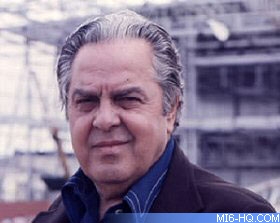
|
Datastream
Name: Albert Romolo 'Cubby' Broccoli
Date of Birth: 5th April 1909
Date of Death: 27th June 1999
Bond Films: 17 ("Dr No" to
"GoldenEye") |
|
Broccoli had been affectionately dubbed "Cubby" since his early days, due to his physical likeness of the popular cartoon character, Abie Kabibble and the name stuck all the way through his film producing days. He was first called Cubby by Pat DiCaicco, his cousin.
Cubby first got a taste of Hollywood when he
visited his cousin Pat - a hotshot film agent - with probable
mob connections, working in Las Angeles. Whilst he was on the
West Coast, Cubby was given the opportunity to observe filming
on "The Outlaw". On set, Broccoli would first meet
the exocentric billionaire, Howard Hughes, who was financing
the picture. At this point, Hughes had fired his director Howard
Hawks and was helming the project himself. When Broccoli was
introduced to the producer-turned-director, he was welcomed back
the following day - this time with a paid position on the crew.
Cubby and Hughes would go on to forge a lifelong friendship and
on the set of the 1941 western, Broccoli gained a great life-long
love for the film industry.
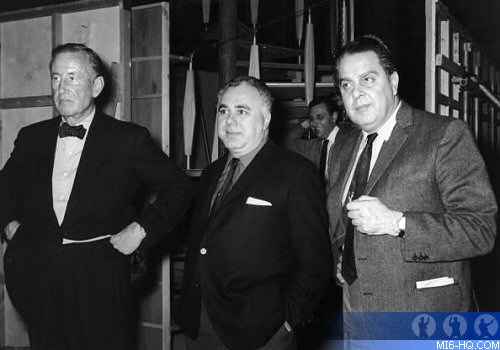
Above: Ian Fleming, Harry Saltzman
and Albert R. Broccoli on the set of "Goldfinger"... |
DiCaicco tried to talk Broccoli into residing
in LA permanently and wined and dined his cousin - introducing
Cubby to an illustrious era of Hollywood faces, including Randolf
Scott, Carry Grant and Bob Hope. But for now, Cubby had his finances
to attend to and soon had to return home to New York, taking
a job as a beauty products salesman.
The opportunity to break back into Hollywood
came to Cubby with a lucky streak betting on horses with his
friend, Bob Howard, the racehorse millionaire. In an immense
stroke of luck, Cubby had earned enough to give up his door-to-door
job and head to Las Angeles. By the time World War II broke out,
Cubby was under contract with 20th Century Fox
as
an
Assistant
Director (one of DiCaicco's many contacts was the film company's
president, Joseph Skak).
In 1940, Broccoli married Gloria Blondell, the actress and sister of Joan Blondell, whom he had met in his new social set. Shortly after the wedding, Cubby was called up to fight with the US Navy after the events of Pearl Harbour. Broccoli served in the forces for four years (1941-45) before returning to LA to find his spontaneous marriage very cool indeed. The pair were divorced in 1945 but by many accounts remained good friends.
Keen to get back into the movie business, Broccoli
called in a favour with his cousin and got a position as the
production manager on the 1946 Irving Allen picture "Avalanche".
The film received a mediocre reception from critics and cinema
goers but it got Broccoli back on the scene after the enforced
absence
and more importantly, Broccoli was introduced to the Polish producer/director
Irving Allen. Cubby would forge a successful working relationship
with Allen and with the encouragement of some of his friends
of the day, including Charles K Feldman and of course his cousin
Pat, Broccoli partnered with Allen to produce pictures.
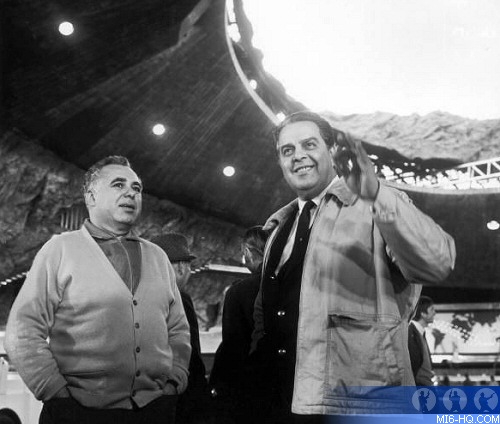
Above: Harry Saltzman and Albert
R. Broccoli inspect the massive volcano set on 28th October
1966, constructed for "You Only Live Twice" (1967) |
Allan and Broccoli founded a company called
Warwick Productions. The company moved to the UK where the government
were making it affordable and effective to produce big-budget
pictures in the country and signed a deal to have their movies
distributed by one of the "little three" Hollywood
labelers, Columbia, in the days when it was an independent distributor.
There were a number of other financial benefits to bringing their
productions to England, but primarily, labour and on-screen talent
was less enforced by the UK unions and hence, lower pay-rates.
The producing partners worked together first on the 1953 production "The Red Beret" (dubbed "Paratrooper" when sold to the US markets), a war flick for which they hired the up-and-coming director, Terence Young. Young assembled a cast that included Alan Ladd - who signed up to Warwick productions after a series of disagreements with his old studio, Paramount. The picture was met with reasonable financial success scoring $8 million at the box office and only costing the producing partners $700,000 to finance. Albert Broccoli quickly became a budding producer.
In 1951 Broccoli met and married his second
wife, Nedra Clarke who accompanied him to the UK to shoot
his picture. The pair adopted their first son, Tony, and in 1958
Clarke gave birth to Broccoli's second child, his daughter Tina.
That same year Nedra fell ill and in the complications
passed away.
Despite busy and harrowing family events, Broccoli
produced sixteen productions between 1953-58, including "Hell
Below Zero" (1954), and "The Black Knight" (1954),
both of which starred Ladd and later, "Safari" (1956)
and "Interpol" (1957).
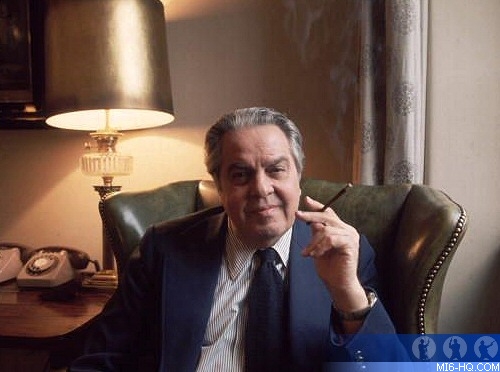
Above: Albert R. 'Cubby' Broccoli
sitting in his Pinewood Studios office (circa 1975) |
In 1957 Broccoli re-read Ian
Fleming's
fifth James Bond adventure, "From
Russia With Love" and
whilst nursing his late wife, considered the possibility of making
Bond into an on-screen adventure. Nedra and Cubby returned to
the USA for the last few months of her life, and whilst there
Broccoli enquired as to the availability of the rights to Bond.
He was initially met with disappointment to hear that there was
another party interested in the opportunity to put Bond on the
big screen and for a while, thought very little of it.
In 1959, Broccoli was married to Dana Natol an actress and novelist in her own right. Cubby took Dana's teenage son, Michael Wilson under his roof as his own and together they parented young Barbara Broccoli.
As the Broccoli-Allan partnership dwindled and
Cubby required a new project and a new production company, the
producer met with Wolf Mankowitz - a friend and British playwright.
During the meeting Wolf revealed that he knew the other party
interested in Bond and it was a Canadian stage producer by the
name of Harry Saltzman.
Mankowitz teed up a meeting between his two
friends and instead of competing for the rights to the suave
secret agent, formed a new production company. Danjaq (a compound
of Dana and Jacqueline, wives of Broccoli and Saltzman) would
be the holding company that would own all the legal rights to
007 and his adventures whilst EON Productions would be headed
up by Broccoli and Saltzman and actively producing James Bond
movies.
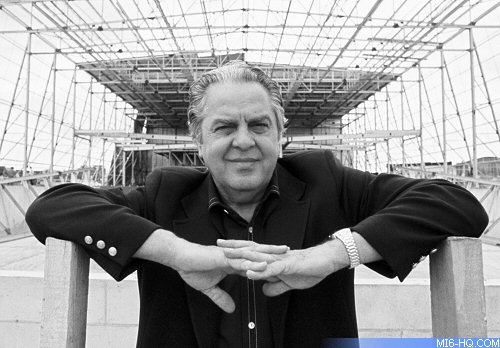
Above: Albert R. 'Cubby' Broccoli
standing in front of the 007 Stage during construction
for
"The Spy Who Loved Me". Image 1996-98 AccuSoft Inc... |
To produce their first Bond picture, Cubby and
Harry needed some very serious financial backing. The pair shopped
around the studios and distributors that might seem prepared
to put their name to a 007 adventure. The books in themselves
were successful in their own right but it took immense insight
to conceive of the success of the Bond films. United Artists,
a division of MGM, agreed to back the production budget of $1
million provided their first picture was "Dr.
No". Bond went into production in 1961 and hit the screen
a year later with "Dr. No" under
the reliable guidance of Broccoli's old colleague, Terence Young
and a young Scots actor portraying Bond: Sean
Connery. The picture proved to be an impressive success and
cemented a nine-film partnership between Broccoli and Saltzman.
Broccoli and Saltzman must have been both lucky
and skilled to attract talent and experience that came with the
likes of Terence Young, Bob Simmons and Ken Adam to the Bond
films and all the whilse knowing exactly what to serve the audience,
time and time again.
|
|
The following year, Broccoli
and Saltzman would produce their one non-Bond
production under the banner of EON Productions. Originally
the deal with UA called for one Bond film and one non-Bond
film to be produced per year. Tthis would quickly fall
by the wayside, however, the film that did make it to
the screen was "Call Me Bwana". Set largely in
Africa and headlined by Bob Hope, whom Broccoli had met
almost
20 years ago as a junior, "Bwana" was a one-of-a-kind
for EON.
Over the first nine Bond films, the Bond
team made immensely successful films and
Broccoli
and Saltzman
saw the transition from Connery, to Lazenby,
back to Connery, before Roger
Moore took up the mantle of Bond. During the production
of "Live And Let Die" and "The
Man With The Golden Gun", Saltzman began to be pre-occupied
with his falling shares and investments and eventually got
to the point where he could no longer have a share in EON
Productions. By the time Roger Moore's second 007 outing
hit the screen Saltzman was all but bankrupt.
Left: Promotional artwork for EON's one non-Bond production, "Call Me Bwana"... |
Broccoli brought Saltzman's shares from his
producing partner and gained 100% control of EON Productions.
He set about his first solo Bond picture in very grand style.
1977's "The Spy Who Loved
Me" proved Broccoli as a more than capable producer,
an expert leader and a loveable and amicable boss for all concerned.
One of Broccoli's biggest challenges came
about
on
this production
- his need for a fantastic finale and somewhere to stage it.
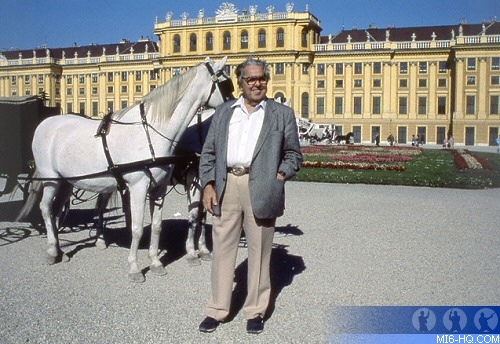
Above: Broccoli on location with "The
Living Daylights" (1987) in Vienna, Austria. |
The picture called for a space that could fit
three life-sized nuclear submarine mockups and Bond and the baddies
could do battle in and around the gigantic bowls of a super-tanker.
There was not a stage in Europe that would house the set dreamed
up by Ken Adam and his team. Instead of rejecting the plan altogether,
Cubby dedicated time and energy to the search and when there
was clearly no place hospitable, sought permission to construct
a soundstage at Pinewood Studios. Dubbed the 007 Stage (and later
the Albert R. Broccoli stage in his memory), the gigantic studio
space in Buckinghamshire, UK is another of Cubby's outstanding
contributions to cinema.
In 1982 Broccoli's achievement in cinema making was recognised by the Academy when he was awarded the Irving G. Thalberg Award - a prestigious award for producers who contribute a consistently high quality of motion picture. Not only Cubby, but also some other fantastic and noteworthy producers have been presented with this award, including Alfred Hitchcock and Walt Disney.
In 1990 Broccoli stood down from his regular
post as executive producer on the Bond films, having completed
the lukewarm "Licence To Kill".
Although now a classic loved by fans, Broccoli's 16th Bond picture
failed to perform up to the usual high-standard for 007 at the
box-office. Despite this minor setback, the legacy of the Bond
pictures had
been
surely
guided
by Cubby's
brilliant leadership for more than 28 years.
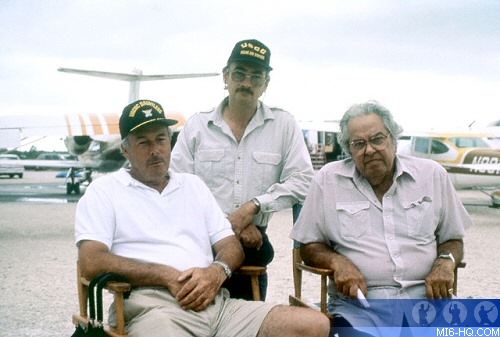
Above (Left To Right): Director John
Glen with producers Michael G. Wilson and Cubby Broccoli
in the Florida Keys filming "Licence To Kill" (1989) |
1995's long-delayed "GoldenEye" saw Michael G. Wilson and Barbara Broccoli take
up the mantle of co-producers - the first co-producers the Bond
films had seen since 1976. Cubby could not completely let go,
and rightly so, overseeing the production of "GoldenEye" as
an un-credited consulting producer.
Later in life, Cubby discovered another passion
- racehorses - the game that had got him to Hollywood in the
1940s. Broccoli owned a horsed named Brocco, which won the Breader's
Cup in 1993.
Albert R. "Cubby" Broccoli passed
away in his home in Beverly Hills, USA in June, 1995, aged 85.
The long-time producer suffered a heart failure. He was given
a Roman Catholic burial and a ceremony attended by Desmond
Llewelyn and Timothy Dalton to
name just a slim selection of his giant Bond family.
The 1997 production"Tomorrow
Never Dies" is dedicated in loving memory to Cubby
Broccoli.
Related Articles
 Biography
Biography
 Broccoli
Season @ BFI
Broccoli
Season @ BFI
 "The Spy Who Loved Me" Production History
"The Spy Who Loved Me" Production History
 James Bond in History (2)
James Bond in History (2)
 Cubby
Broccoli's Non-Bond Movies (Post Dr. No)
Cubby
Broccoli's Non-Bond Movies (Post Dr. No)